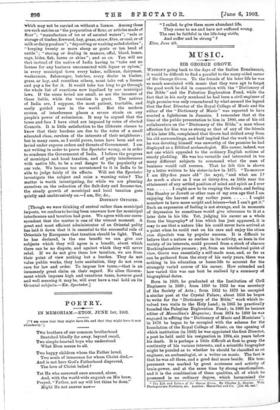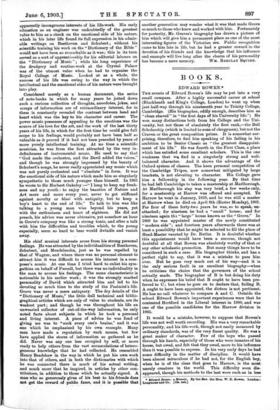MUSIC.
SIR GEORGE GROVE.
WITHOUT going back to the days of the Italian Renaissance, it would be difficult to find a parallel to the many-sided career of Sir George Grove. To the friends of his later life he was so much associated with music that they were apt to forget the good work he did in connection with the " Dictionary of the Bible" and the Palestine Exploration Fund, while the fact that in his early manhood he had been a civil engineer of high promise was only remembered by what seemed the legend that the first Director of the Royal College of Music and the editor of the " Dictionary of Music " was reported to have erected a lighthouse in Jamaica. I remember that at the time of the public presentation to him in 1880, one of his old collaborators on the "Dictionary of the Bible," a man whose affection for him was as strong as that of any of the friends of his later life, complained that Grove had drifted away from his old surroundings, and half implied that the work to which he was devoting himself was unworthy of the promise he had displayed as a Biblical archaeologist. His career, indeed, was not one which appealed to the ordinary English notions of steady plodding. He was too versatile and interested in too many different subjects to command what the man of business would call success. That be felt this is shown by a letter written to his sister-in-law in 1875. "To-morrow I am fifty-five years old" (he says), "and what am I? As much a slave as I was at thirty-five, as little near the attainment of any settled position of mind and spirit as I ever wss I ought now to be reaping the fruits, and feeling like Stanley or Jowett or other men of my own age that I am enjoying the harvest of my earlier years I ought somehow to have more weight and leisure—but I can't get it." Such an expression of feeling is not strange, and in moments of depression he sometimes would give utterance to it at a later date in his life. Yet, judging his career as a whole from the biography* of him which has just appeared, it is easy to see that a nature like his could never have arrived at a point when be could rest on his oars and enjoy the otiuns cum dignitate won by popular success. It is difficult to believe that a nature so restless in its activity, so keen in the variety of its interests, could proceed from a stock of obscure Buckinghamshire yeomen ; yet, from an intellectual point of view, Grove was essentially a self-made man, and, so far as can be gathered from the story of his early years, there was nothing in his education or home-life to account for the strangely varied course of his career. How extended and how varied this was can best be realised by a summary of biographical dates.
Born in 1820, he graduated at the Institution of Civil Engineers in 1839 ; from 1850 to 1852 he was secretary of the Society of Arts ; from 1852 to 1873 he occupied a similar post at the Crystal Palace ; about 1856 he began to write for the "Dictionary of the Bible," work which in- volved two visits to the Holy Land ; in 1865 he practically founded the Palestine Exploration Fund; in 1868 he became editor of Macmillan's Magazine; from 1874 to 1889 he was engaged in editing the " Dictionary of Music and Musicians"; in 1878 he began to be occupied with the scheme for the foundation of the Royal College of Music, on the opening of which institution (in 1883) he was appointed the first Director, a post he held until his resignation in 1894, six years before his death. It is perhaps a little difficult at first to grasp the continuity of his various interests, and a scientific biographer might be puzzled as to whether he should be classified as an engineer, an archaeologist, or a writer on music. The fact is that he was all three, and a good deal more beside. His tem- perament was marked by great acuteness and activity of brain-power, and at the same time by strong emotionalism, and it is the combination of these qualities, all of which he possessed in no ordinary degree, which harmonised the
• The Life and Letters of Sir George G rore. By Charles L. Graves. With Photogravure Portraits, Sc. Loudon. Macmillan and Co. [12s. 61. net.1 apparently incongruous interests of his life-work. His early education as an engineer was undoubtedly of the greatest value to him as a check on the emotional aide of his nature, which in his later life found its full expression in his admir- able writings on Beethoven and Schubert ; without his scientific training his work on the "Dictionary of the Bible " would not have been so remarkable as it was ; this in its turn served as a sort of apprenticeship for his editorial labours on the " Dictionary of Music " ; while his long experience of the drudgery and routine-work at the Crystal Palace was of the utmost value when he had to organise the Royal College of Music. Looked at as a whole, the success of his life was owing to the way in which the intellectual and the emotional sides of his nature were brought into play.
Considered merely as a human document, the series of note-books in which for many years he jotted down such a curious collection of thoughts, anecdotes, jokes, and scraps of information are of extraordinary interest, for in them is constantly revealed the contrast between head and heart which was the key to his character and career. The power music possesses of appealing to the emotions was the source of his love for the art, and the work of the last thirty years of his life, in which for the first time he could give full scope to his feelings, would probably not have been half so -valuable as it proved if it had not been preceded by years of more purely intellectual training. At no time a scientific musician, he was from the first attracted by the very in- definiteness of instrumental music. He used to say that " God made the orchestra, and the Devil added the voices," and though he was strongly impressed by the beauty of Schubert's songs, he never really appreciated any music which was not purely orchestral and " absolute" in form. It was the emotional side of his nature which made him so singularly sympathetic to those much younger than himself. In 1865 he wrote to Sir Herbert Oakeley :—" I long to keep my fresh- ness and my youth : to enjoy the beauties of Nature and Art more and more every year, never to get stiffened against novelty or blasg with antiquity, but to keep a boy's heart to the end of life." To talk to him was like talking to a young man wise beyond his years, yet with the enthusiasm and heart of eighteen. He did not preach, his advice was never obtrusive, yet somehow an hour in Grove's company was like a strong tonic, and after a talk with him the difficulties and troubles which, to the young especially, seem so hard to bear would dwindle and vanish away.
His chief musical interests arose from his strong personal feelings. He was attracted by the individualities of Beethoven, Schubert, and Mendelssohn, just as he was repelled by that of Wagner, and where there was no personal element to attract him it was difficult to arouse his interest in a com- poser's music. At one time I tried hard to enlist his sym- pathies on behalf of Purcell, but there was no individuality in the man to arouse his feelings. The same characteristic is noticeable in his earlier work ; it was the strongly marked personality of David which attracted him and led to his devoting so much time to the study of the Psalmist's life. Grove was never a mere antiquary. The dry details of the "Dictionary of Music," the little dull technical and biblio- graphical articles which are only of value to students, are its weakest part ; and though he was throughout his life an unwearied collector of out-of-the-way information, he only noted facts about subjects in which he took a personal and living interest. A piece of advice he was fond of giving me was to "suck every one's brains," and it was one which he emphasised by his own example Many men have made a reputation by such means, but few have applied the stores of information so gathered as he did. Never was any one less occupied by self, or more ready to help others from the vast accumulations of hetero- geneous knowledge that he had collected. He resembled Henry Bradshaw in the way in which he put his own work into that of others, and in both the dictionaries with which he was connected there is much of his actual writing, and much more that he inspired, in articles by other con- tributors, in addition to those which he actually signed. A man who so generously gives of his best to his friends does not get the reward of public fame, and it is possible that
another generation may wonder what it was that made Grove so much to those who knew and worked with him. Fortunately for posterity, Mr. Graves's biography has drawn a picture of him which will give him a permanent place as one of the most interesting figures of the Victorian era. Public recognition came to him late in life, but he had a greater reward in the devotion of his friends and the knowledge that his influence and example will live long after the charm of his personality











































 Previous page
Previous page